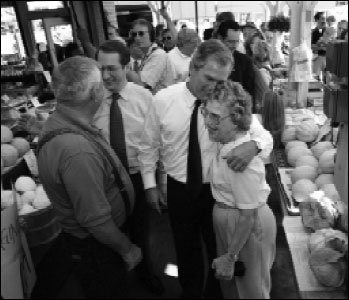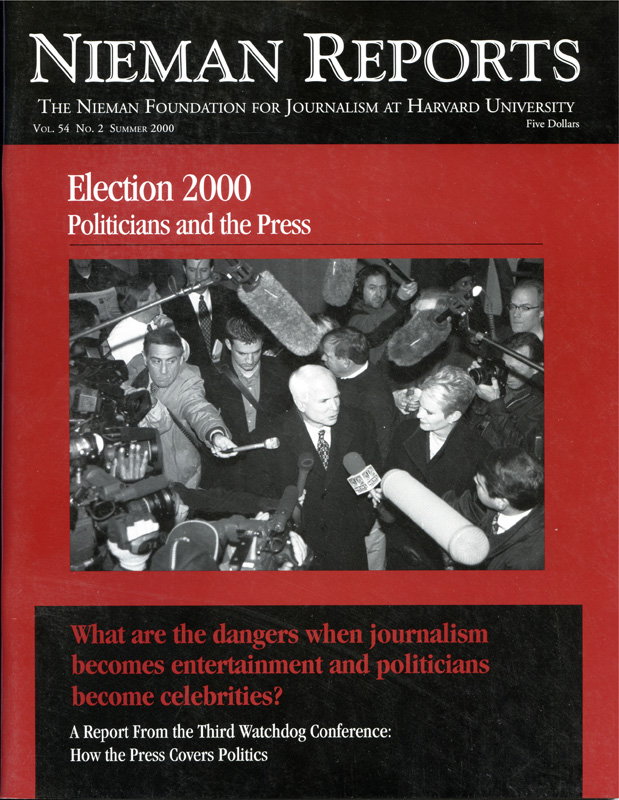
George W. Bush at the Roanoke City Market. Photo by Natalee Waters, The Roanoke Times.
If you want to make a list of the favorite platitudes of national political reporters, one phrase rises to the top: All politics is local.
At one time or another, nearly every national scribe, with a suitably somber face and furrowed brow, spits out that cliché, usually to explain to the great unwashed some critical twist of the campaign season. Those four magic words, which come to us courtesy of former Speaker of the House Tip O'Neill, who knew a thing or two about the business, have long served as a convenient catchall to explain a multitude of things political.
But here’s a confession: When I covered national politics for Time magazine, I never fully appreciated the import of that phrase, although I often used it to wrap my mind—and others’ minds—around the latest turn of events. It was only when I moved to the Blue Ridge Mountains of southwest Virginia to become editor of The Roanoke Times that the real meaning of that phrase became clear. When my political prism shifted from national to local—a tectonic shift in perspective—the power of O’Neill’s words came into sharp focus. The chief lesson: Local is real; national is not. But more on that later.
Back in 1987, I fell into national political reporting when my boss at Time called me from New York and asked if I wanted to cover the upcoming presidential campaign. I nearly jumped out the window of the Los Angeles bureau, and offered up—without hesitation, as I recall—a significant body part for that golden opportunity (thank God my boss didn’t take me up on that aspect of the deal).
During the next 12 years, I covered national politics in one way or another. I crisscrossed the country with Michael Dukakis on Sky Pig, his bargain-basement jet. I stared in awe at Bill Clinton in 1992 as he survived Gennifer Flowers in New Hampshire. And then I created what’s become the granddaddy of political Web sites, allpolitics.com, for Time and CNN, which allowed me to watch, in grainy streaming video on my computer, as President Clinton barely survived Monica Lewinsky.
Covering politics at the national level was a blast, and seemed, at times, a grand game, almost too fun to be real. The personalities were fascinating, the stories gripping, the scandals momentous. In many ways, national politics—at least as we understand and report it—is pure theater, an entertaining spectacle played out largely inside the beltway amphitheater, with cameo appearances at key venues across the nation. On the TV news, the leading politicians have become protagonists, the distant cardboard cutouts who spout out sound bites. Most of what they say and do has little impact on real people; their words and actions are detached and disconnected; their brand of politics is anything but local.
The traditional formula we use to cover national politics—heavy on spectacle and light on substance (with enough token issues coverage thrown in along the way to pretend that we’re taking it all quite seriously)—feeds that sense of disconnection, defined by the inability of politicians and citizens to carry on meaningful dialogues. In a presidential campaign, for example, real connections are possible only in a few places—namely Iowa and New Hampshire—and after that the campaign moves into a cocoon, with journalists acting as somewhat awkward and obfuscating filters. So it’s easy to get dispirited while covering that superficial sort of campaign.
In hopes that the Internet offered an opportunity to reconnect these disparate parties, I jumped at the chance in 1995 to build and run allpolitics.com, which I thought offered a high-tech chance to bridge that great disconnect. The idea was to cover all the political news, as broadly and as deeply as we could. We would have no more pure fluff at the expense of substance. Because we weren’t constrained by newsprint costs or airtime, we had a virtually unlimited ability to focus on issues we thought were important. So, in addition to covering the traditional stories of the day, we could spend time exploring not-so-sexy-but-darn-important issues such as welfare and campaign finance reform. The site featured lots of interactivity, including message boards and chat rooms, which we hoped would build communities of interest and start reconnecting people to the political process.
Traffic grew and, when we posted the first real-time election results on line during election night 1996, we glimpsed the huge impact and potential of politics on the Internet.
But not everyone saw our potential as clearly. The site failed to bring in much money, and corporate interest waned. Then came the Lewinsky story which, while it drove millions of page views each day, also confirmed that the soap opera of politics could once again trump any notions of substance. When I drove to work those mornings, I literally dreaded spending another day covering the sordid saga, knowing that people seemed far more concerned about the latest titillation of Monica and Bill than about any story of import.
That was about the time I headed to Roanoke, trading the nomadic life of covering national news for a close-knit community where my family and I could put roots down. And it was here that I began to finally understand just what Tip O’Neill was talking about.
Politicians here aren’t cardboard cutouts (though some of them are certainly characters); nor are they the daily butt of David Letterman jokes. Instead, they’re the real thing. You run into them while shopping at the City Market or eating at The Roanoker restaurant. They live down the street or in a nearby neighborhood. Their kids go to school with your kids. There is a human scale to these politicians—they’re approachable—and they like it that way. So do their constituents, who are our readers, and that means we cover politics here in a radically different way.
We avoid publishing horserace stories (for the most part), along with the rumors, the gossip, and innuendo. Here, politics is not a sport or an entertainment, which meant that the Clinton impeachment news rarely made the front page. Instead, our coverage of politics is defined by issues that hit home, that touch the lives of our readers. We closely cover the city council, whether it’s wrestling with a water shortage or creating a ruckus by changing the date for trick-or-treating. We keep a close eye on our state legislators as they battle for regional road projects, argue about whether high school students can carry hunting rifles in their trucks on school property, or try to find ways to help laid-off textile workers. These are bread-and-butter issues with real regional impact, and that’s what we want to cover on our pages.
In Roanoke, we waited a long time before putting presidential primary stories on the front page, even though we played plenty of them inside. And there were days when I had to muffle my instinctive love of national politics to keep from pressing to play more of these political stories more prominently. I realized, however, that most of our readers simply weren’t hungry for them and that we could use the news hole in far better ways.
When George W. Bush came through our town, we certainly covered him. And our reporters wrote a few on-the-ground-with-local-organizers stories, but otherwise we relied on wire service reports for our coverage. We’d troll through wire copy, however, looking for meaningful analysis rather than coverage of the controversy of the day. In the fall, we will focus primarily on the already antagonistic Robb-Allen senate race. This hits home with our audience. And we’ll track the presidential race through the wires.
At this level, it’s possible to see more clearly how representative democracy is meant to work. It’s good for politicians to live in the community and rub shoulders with real constituents, rather than spending much of their time courting deep-pocketed donors. That closeness builds a fair amount of accountability, because people here can reach out and touch their politicians to keep them in line.
The newspaper’s role is straight-forward: Keep the conversation honest by closely following politics as it touches the lives of real people. That’s a sharply focused litmus test for our coverage, and most of the time it works well. I’m sure there’s some sagacious Greek philosopher who put it better, but it’s clear that democracy works best when the distance between the governors and the governed is least.
So on the way from Washington to Roanoke, I’ve learned plenty of journalistic lessons:
- Local politics is real and human and immensely complex. It has a direct and powerful impact on people’s lives. And it deserves serious, sustained coverage.
- The newspaper has a responsibility to cover all the important issues and to explain their impact in a meaningful way. That’s a purpose easily shirked at the national level. The stakes here are high, because if we fail to cover our politics well, nobody else will.
- Readers here want hard results and understanding, not frothy entertainment. They care deeply about the future of their region, and their concern keeps both the newspaper and politicians honest.
Now, don’t get me wrong. I haven’t yet given up on the Internet. I’m still rooting for it to revolutionize politics in 2000, or 2004, or 2008, and I know it will one day allow us to play a more powerful role in this region. While I’d love to see the Internet empower and connect people in the best possible ways, the odds of that happening immediately are pretty slight. So, for right now, I know I’m in a place where the daily newspaper can have plenty of impact, and that’s a great feeling.
Mike Riley, a former bureau chief for Time and Executive Producer of allpolitics.com, is Editor of The Roanoke (Va.) Times.



